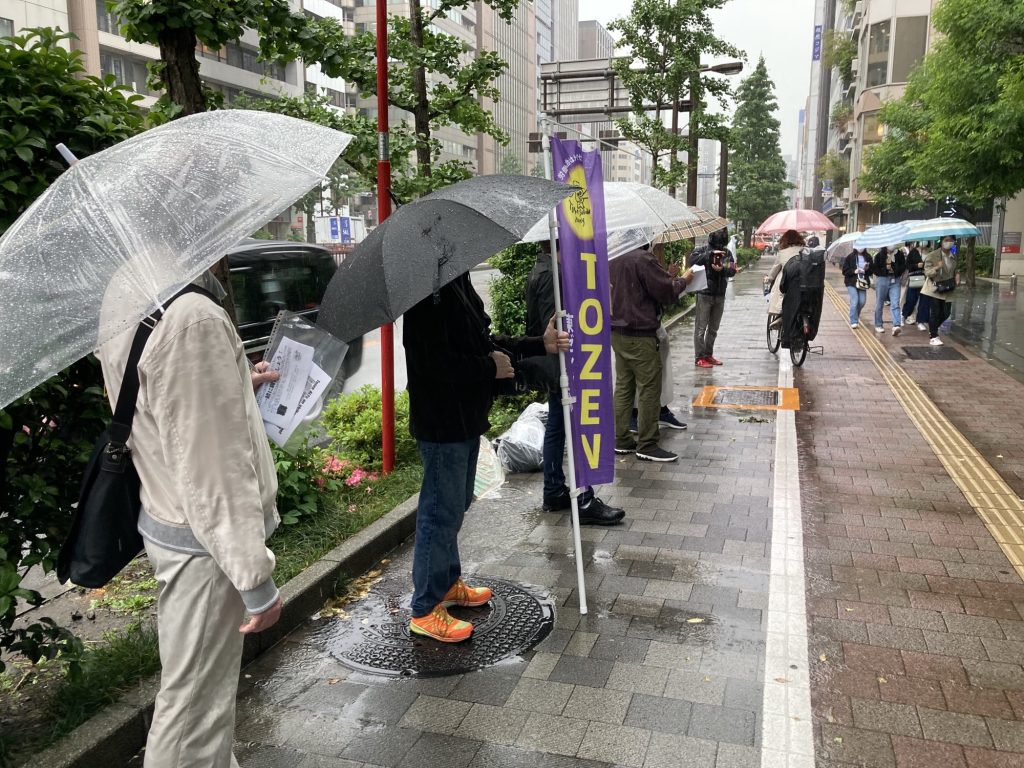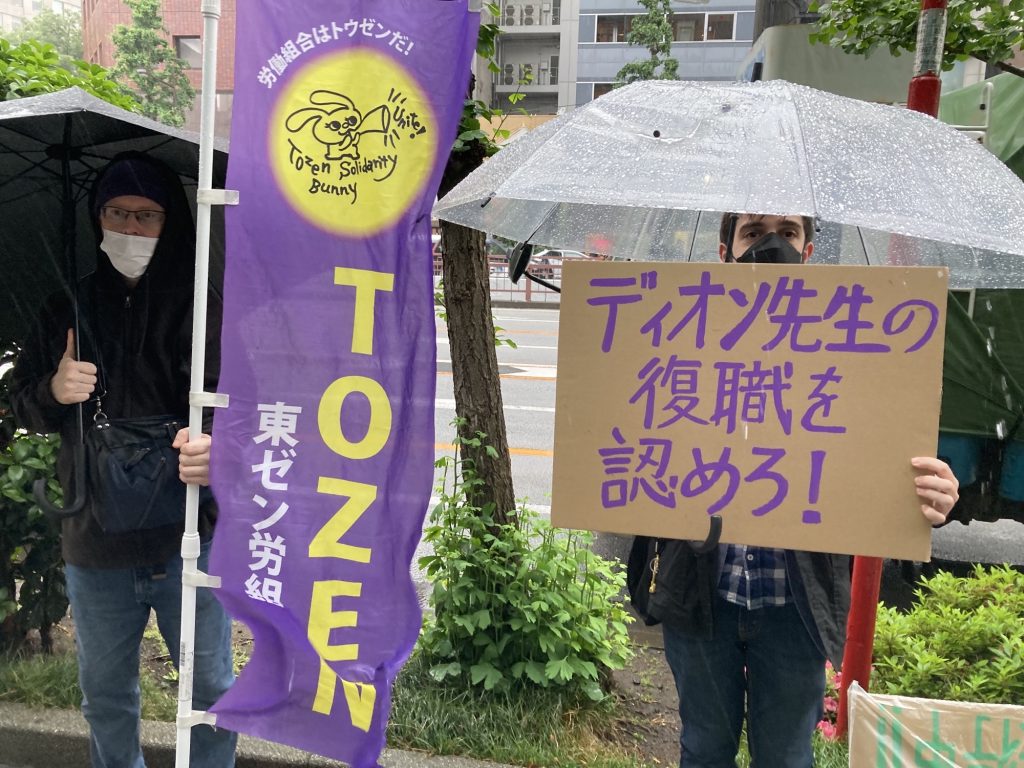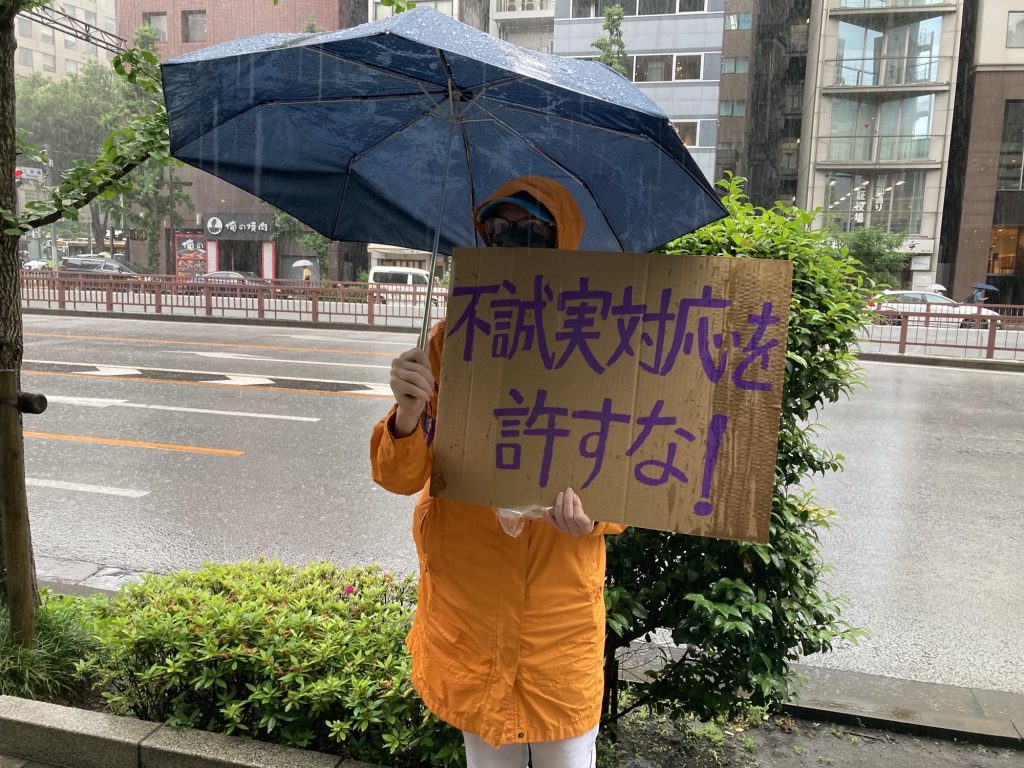Our campaign to improve working conditions at Interac is important not just for ALTs , but for students and Japan’s education system. In addition, this has now become a campaign to defend our right to strike at Interac.



Our campaign to improve working conditions at Interac is important not just for ALTs , but for students and Japan’s education system. In addition, this has now become a campaign to defend our right to strike at Interac.




On May 11, 2021, Tozen Union entered into dispute with Interac. Since our first collective bargaining (CB) in October 2019, Tozen Union and Interac have taken several important steps toward working out a deal. But after twenty-six CB sessions, workplace safety and wage issues remain. Our campaign to improve working conditions at Interac is important not just for employees, but for students and Japan’s education system.
2021年5月11日より東ゼン労組は株式会社インタラック関東南と(以下、インタラック)労働紛争に入りました。2019年10月に行われた初の団体交渉以来、東ゼン労組とインタラックは解決の方向へ進展を遂げてきました。しかし、職場の安全と賃金については、26回もの団体交渉を繰り返す中で、未だに進展がありません。東ゼン労組がインタラックの労働条件をより良くしようと挑んでいるこのキャンペーンは、労働者だけではなく、生徒たちや日本の教育システムにとっても大事な活動です。
Interac teachers in Kanto enter second round of collective bargaining. They’re demanding full-time permanent employment, shakai hoken, a 20% pay raise, a ¥600,000 yearly bonus, a time card, a prior consultation agreement, and a union page on the Interac employee website.
緊急団交申し入れ Emergency Request for CB
全国一般東京ゼネラルユニオン(略称:東ゼン)ならびに全国一般東京ゼネラルユニオン東ゼンALT支部は、貴社に対して、緊急団体交渉を申し入れます。貴社は先日、当組合員らを含む従業員らに対して、薬物検査を受けるよう指示したと伺いました。薬物検査は、通常の雇用関係においてはこれを行う必要性が認められず、よほどの事情がない限り、従業員に広く行われるものではないはずです。昨今の個人情報保護の重要性に鑑みても、安易にこのような検査を実施することに対して、大きな疑問を抱きます。
つきましては、下記の議題にて団交を実施したく存じます。
Zenkoku Ippan Tokyo General Union (“Tozen”) and Zenkoku Ippan Tokyo General Union Tozen ALTs request emergency collective bargaining. We have heard that you instructed your employees, including union members, to undergo drug testing. The need for drug testing is not accepted for an ordinary employment relationship and drug testing of employees in general is accepted only in extreme circumstances. We strongly oppose your casual testing of employees also in light of recent requirements to protect individual privacy, including the passage of Individual Information Law, We therefore ask for cb with the agenda stated below.
記
It seems that around this time every year, people in the Interac office attempt to cut save another few yen at the expense of the people that are actually out in the classroom doing all of the actual work. They call teachers into their office and attempt to
force
them to sign resignation papers.
DON’T let Intearc/MAxceed force you to sign anything that says you agree to non-renewals.
If they plan on non-renewing you, force them to do the honorable thing and actually fire you so that you can claim your unemployment benefits as you look for a new job.
Also, don’t forget that according to Japan’s Labor Standards law, you do have the right to fight your dismissal by an employer. This is a direct quote from the “Foreign Workers’ Handbook” published by the government that can be found here:
Hello all,
It is that time of year again! Time for the mad scramble of March when good teachers everywhere are worried if their contracts are going to be renewed or not, otherwise known as the “ALT Shuffle”. Two things you should be sure NOT to do:
1) Do NOT let your employer force you to sign resignation papers! You do not need to sign any such thing. If they do not have work for you, they should give you dismissal papers so that you can claim your unemployment benefits until you find your next job.
2) Do NOT let your employer threaten you into leaving your apartment. It does not matter whether your employer is your guarantor or not, you can pay your landlord directly. Tenant’s rights are strong in Japan, but they are non-existant if you do not claim them.
If you find yourself facing either of these situations, call your local union representative to report the harassment.
If you are not in a union, and would like to fight against these kinds of ill treatment, join a union and help improve the working conditions of Japan.
Solidarity,
Erich
To: All instructors
From: Kevin Salthouse, General Manager, Human Resources and Class Management
Division
Subject: Response to rumors concerning the financial stability of Interac.
Date: September 26, 2010
Earlier this month, I wrote a message in the ‘Interac-shin’ newsletter announcing that the Selnate Group was re-organizing into a new group under the Interac name. This change will be effective October 1, 2010.
Unfortunately, comments have been made on the forums of some well-known websites this weekend suggesting that Interac may be in financial difficulty or be going bankrupt. I am deeply concerned that such rumors may cause you worry and stress. So, let me categorically state that Interac is financially stable and in absolutely NO danger of going bankrupt. I would like to put an end to such rumors here and now. Nor will the re-organization have any impact on your jobs or working conditions.
For those of you that did not get the memo, Interac is about to go through some big changes. I have heard two very different announcements on the subject. From Kevin Salthouse, we all have this PDF file stating that Interac will be going through a “new phase of operations” and that this is just a “reorganization”. The General Union in Osaka however, has uncovered more details that point towards a new aquisition and a buyout by Advantage Partners, a company that describes its own business model as “Direct private equity investment via start-up and acquisition”.
It appears that Interac as we know it may be completely taken over and dissolved, although we may not know for sure until October first. Interac recently lost its right to do business with Osaka prefecture BoEs when it was found guilty of an Unfair Labor Practice against the General Union and of interfering in union business. Our members that have sued Interac have also won several court cases, meaning even more financial punishment.
When I originally heard of the name change and the association with bankruptcy, I was a bit skeptical. I thought Interac may have been changing names to avoid paying the damages to union members and as a way to get around the recent ruling that prevents them from doing business in Osaka prefectural BoEs. This certainly would not have been out of character for them; they have for years had a second name, Maxceed, that they used to double-bid BoEs across the nation. They would submit one bid as Interac, and one bid as Maxceed, and shuffle their ALTs between Maxceed/Interac contracts as needed. I was hired as an ALT for Interac in 2005, and was placed in a city where I was expected to lie to the BoE and tell them that my company was called “Maxceed”. The contract between the BoE and the dispatch company said “Maxceed”. My contract with the people in the same office, with the same employees with a different phone number said “Interac”. Also, in the past year, ALTs have complained to us that their time is split between “Maxceed” and “Interac” so that Interac can pretend that the ALT has two part time jobs, instead of a full time job and have an excuse to avoid giving the ALT full time benefits. If Interac is going to be dissolved, these kinds of practices never favored the ALT’s working conditions, and they will not be missed.
Whether Interac will be going fully under or whether things will really just be “reorganized”, my personal concern, shared among my fellow union members, is centered on the stability of employment for the foreign teachers in Japan. I am urging every ALT in Interac/Maxceed/every-other-dispatch-company-in-Japan to band together, unionize and fight back to improve working conditions for yourselves and for the people who will want to come to Japan and teach here in the future. Demand to be directly hired! Every Interac/Maxceed contract I have ever seen has either been
1) illegal according to the The Ministry of Education guidelines concerning proper dispatch methods or
2) has enough clauses in it that violate Labor Standards/Trade Union Law that the whole thing is null and void.
If you unionize and claim your right to be directly hired, the BoEs will not be able to ignore you. I have seen it myself; the when I was in Osaka and a member of the General Union, we forced my BoE to direct hire, and the ALTs there are in a much better position today than they were in 2005.
If you are tired of the instability of your job, of getting reduced or no pay for March or August, of getting penalized for being sick, then you should force the BoE to take responsibility. Unionize, and demand direct employment and the full benefits that you are entitled to under the law.
In Solidarity,
Erich Manning
http://interacunion.org/
https://tozenunion.org/
http://interac.generalunion.org/
http://fukuoka.generalunion.org/
Cross posted from the General Union.
Let’s all work together for ALTs to be directly hired.
———————————————–
Interac has been found guilty of unfair labour practices by the Osaka Prefectural Labour Commission in July 2010 for refusing to hold collective bargaining with the General Union (full story here).
Osaka prefectural ordinances prevent companies found in violation of Trade Union Law from bidding on public projects. The General Union, along with allied unions from Osaka Union Network and Osaka Zenrokyo have submitted demands to the Governor of Osaka Prefecture, Toru Hashimoto, that Prefectural ordinances be enforced.
As a result, Osaka Prefecture has now informed all divisions of the prefectural government, including the Osaka Prefectural Board of Education, that they may no longer enter into contracts with Interac. Furthermore, Osaka Prefecture has summoned Interac to explain the situation, placing further pressure on the company to obey the Trade Union Law and negotiate.
The union’s victory at the Labour Commission and its subsequent economic impact on Interac will go along way in making sure that not only Interac, but other employers trying to evade their legal obligations, negotiate with the union in the future.
Cross-posted from the General Union in Osaka:
5 Jul 2010
Health Checks – They’re mandatory!
Interac ordered to obey the law
Industrial Health & Safety Act
For many westerners, the idea of a state mandated health check smacks of a nanny state, and we are often reluctant to submit to the tests. While not all companies obey this law, the fact remains it is compulsory for all employees to have an annual health check under article 66 of the act.